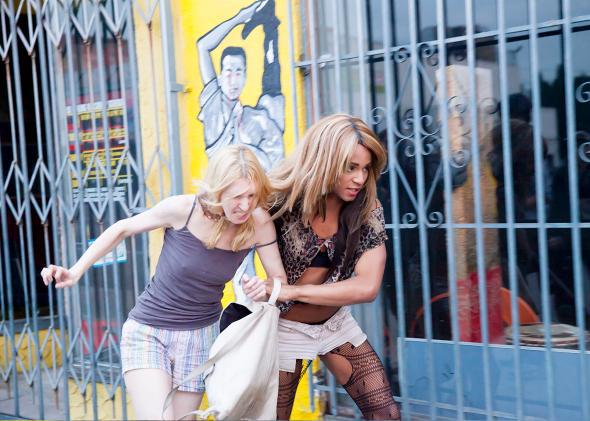It’s the morning of Christmas Eve at the sketchy intersection of Santa Monica and Highland in Los Angeles, where a pair of transgender prostitutes, Alexandra and Sin-Dee Rella, are sharing a red-and-green sprinkled donut. Sin-Dee has just finished serving a month in prison for drug possession, and her first wish on regaining her freedom—after she’s done splitting a donut with her devoted but trash-talking best friend—is to reunite with her pimp/boyfriend Chester. But as Alexandra indiscreetly lets drop, Chester has been messing around since his best girl was away—and to rub salt in the wound, his latest dalliance is a biological female of Caucasian descent (in Sin-Dee and Alexandra’s disdainful parlance, a “white fish”). An incensed Sin-Dee drags the reluctant Alexandra out of Donut Time and into the street on what will prove to be a daylong quest to locate and smack down the errant Chester and his new lady friend.
Meanwhile, Razmik, an Armenian immigrant who drives a yellow cab, is dealing with two terrible passengers, drunken revelers who barf all over his backseat then try to weasel out of paying their fare (“come on, man, it’s Christmas!”). Razmik’s weary matter-of-fact manner as he kicks these losers to the curb suggests this dismal Dec. 24 isn’t all that different from his average workday—at least, until Alexandra flags down his cab and gets in. The encounter that follows will reveal unexpected depths in both characters, and new layers of moral complexity in Sean Baker’s unmissable Tangerine, a sneaky slice-of-life indie that comes on all casual and cinéma-verité in the early scenes, then slowly coalesces into a romantic comedy as intricately constructed as any door-slamming stage farce.
Baker has made five feature films so far, each concentrating on a different subculture rarely made visible on mainstream movie screens. His 2004 breakthrough, Take Out, focused on the life of a Chinese immigrant in New York trying to deliver enough takeout meals to pay off a debt. Prince of Broadway explored a very different New York immigrant experience, that of a Ghanaian clothing hustler who’s unexpectedly saddled with a baby his ex-girlfriend swears is his. And Starlet, a drama about female friendship that happened to be set against the backdrop of the San Fernando Valley porn industry, set itself apart by refusing to milk its potentially lurid milieu for titillation, comic relief, or sentimental moralizing. He has a preference for using mainly non-professional actors—Mya Taylor and Kitana Kiki Rodriguez, who both shine in their roles as Alexandra and Sin-Dee, are real-life friends whom Baker met while spending time at a Los Angeles LGBTQ community center. (Karren Karagulian, who plays Razmik, got his start in the film industry as a non-professional cast member in Baker’s first film, Four Letter Words.) Baker casts a compassionate and nonjudgmental gaze on every one of his struggling, screwed-up characters, even when they make dubious life choices. In Tangerine, that includes smoking meth, forcibly abducting one’s romantic rivals, and—most damning of all, at least in Sin-Dee’s eyes—stepping out on one’s boo.
No one in this story is all villain, all hero, or all victim. Baker—who also co-wrote the script with Chris Bergoch, served as co-cinematographer, and edited the film—possesses an amplitude of moral vision that feels particularly fresh in a movie about transgender people, for so long culturally visible primarily in the guise of tragic drag queens. Alexandra’s huffy response when another character uses the term “drag show” to describe her Christmas Eve cabaret act makes it clear how far she’s moved beyond what she feels to be a crude conception of gender performance. The one song we see Alexandra deliver, a quietly melancholy cover of the old Doris Day Christmas song “Toyland,” constitutes the movie’s emotional high point, with its lyrics imagining an idyllic “little girl and boy land” whose borders, once traversed, can never be crossed again.
Baker’s combination of acute emotional intelligence and raucous, often bawdy humor sometimes brings to mind Fatih Akin, a German filmmaker of Turkish descent who also likes to set his films (Head-On, The Edge of Heaven, Soul Kitchen) in tough urban areas where conflicting cultural value systems meet and clash. But Baker has his own confidently off-kilter style, one that swings freely between micro-budget roughness—shot entirely on the iPhone 5s, Tangerine is full of casually composed shots and choppy jump cuts—and impressive technical sophistication. One stylized montage, unexpectedly set to a surging symphonic work by Beethoven, uses anamorphic lens effects to distort and flatten out the sun-drenched streetscape behind its subject’s head.
Once you get a sense of the high emotional pitch at which these characters live their lives—and of the ever-present fear (of eviction, of imprisonment, of poverty and loneliness) that fuels those lives’ exhausting intensity—Tangerine, which might be described as a steadily escalating 87-minute cascade of F-bomb-laden shouting matches, begins to unfold some of its secret subtleties. Sin-Dee and Alexandra’s last, quiet scene together, in a laundromat not far from the same Donut Time franchise where they began their action-packed Christmas Eve, succeeds at once as a new kind of female buddy comedy and as a rueful reflection on the meaning of coming home—by whatever definition you choose to understand that word—for the holidays.
